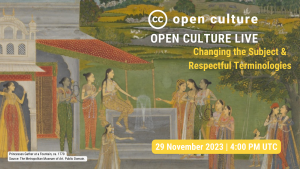CC Global Summit 2023: Reflections
vendredi 1 décembre 2023 à 02:43[lee esta entrada en español >]
We want to share a message regarding some learnings obtained after the 2023 Creative Commons Global Summit and meeting with our Mexican organizing committee and members of the local community.
Financial decisions related to the CC Summit were made by the CC team and not by the local Mexican Chapter. Specifically the cost of entry to the event, which proved to be high in relation to the contextual conditions of Mexico. Due to difficult fundraising conditions for many nonprofits in 2023, the CC team decided to keep the entrance fee higher, offer discounted rates, and scholarships for attendees. We wish to learn from this experience for future events, as it is clear that if we want to continue our value of global inclusion, it is necessary to create a new formula to eliminate access barriers for those who wish to attend our events.
Initially, the estimated cost for simultaneous translation provided to us was above our budget. For this reason, we hired SyncWords to provide live subtitles, human and automatic translations for each of the sessions and panels in the main auditorium. The translations could be accessed through the QR code that we had published in various places (this code provided access to a SyncWords page that displayed the subtitles and the translation). We also offered translation (English/Spanish) according to the needs of our attendees, with bilingual people available in each room and in the auditorium. However, as we began the event we recommended that it was imperative to have simultaneous audio translation to encourage dialogue and follow our value of global inclusion. We especially thank the Tlatolli Ollin Professional Interpretation and Translation Services cooperative, which won the challenge by providing excellent service in a short time.
No one in our Mexican Chapter should be held responsible for any decision, nor should their reputation be tarnished by decisions made during the Summit. After such big events, there are always lessons to be learned and one of them is how CC, as a small global non-profit, which has to raise funds every year to survive, can better support our local chapters that provide so much wisdom and experience.
I want to personally thank everyone involved in the CC Summit and we will continue to work to create a world where knowledge and creativity are accessible to everyone.
Sincerely,
Catherine
Español
Queremos compartir un mensaje referente a algunos aprendizajes obtenidos después de la Cumbre Global Creative Commons 2023 y de reunirnos con nuestro comité organizador mexicano y miembros de la comunidad local.
Las decisiones financieras relacionadas con la Cumbre CC fueron tomadas por el equipo de CC y no por el Capítulo Mexicano local. Específicamente el costo de la entrada al evento, el cual se consideró alto en relación a las condiciones contextuales de México. Debido a las difíciles condiciones de recaudación de fondos para muchas organizaciones sin fines de lucro en 2023, el equipo de CC decidió mantener la tarifa de entrada más alta, ofrecer tarifas con descuento, y becas para los asistentes. Deseamos aprender de esta experiencia para eventos futuros, ya que está claro que si queremos seguir nuestro valor de inclusión global, es necesario crear una nueva fórmula para eliminar barreras de acceso para aquellos que deseen asistir a nuestros eventos.
Inicialmente, el costo estimado para traducción simultánea se nos proporcionó por encima de nuestro presupuesto. Por tal motivo contratamos a SyncWords para realizar subtítulos, traducciones humanas y automáticas en vivo para cada una de las sesiones y paneles en el auditorio principal. Se podía acceder a las traducciones a través del código QR que habíamos publicado en varios lugares (dicho código proveía acceso a una página de SyncWords que mostraba los subtítulos y la traducción). También ofrecimos traducción (inglés/español) según las necesidades de nuestros asistentes, con personas bilingües disponibles en cada sala y en el auditorio. Sin embargo, al comenzar el evento decidimos que era imperativo contar con traducción de audio simultánea para fomentar el diálogo y seguir nuestro valor de inclusión global. Agradecemos especialmente a la cooperativa Tlatolli Ollin Servicios Profesionales de Interpretación y Traducción que aceptó el desafío brindando un excelente servicio en poco tiempo.
Nadie en nuestro Capítulo Mexicano debe ser responsabilizado por ninguna decisión, ni su reputación debe verse empañada por las decisiones tomadas durante la Cumbre. Después de eventos tan grandes, siempre hay lecciones que aprender y una de ellas es cómo CC, como una pequeña organización global sin fines de lucro, que tiene que recaudar fondos cada año para sobrevivir, puede apoyar mejor a nuestros capítulos locales que brindan tanta riqueza, sabiduría y experiencia.
Quiero agradecer personalmente a todos los involucrados en la Cumbre CC y continuaremos trabajando para crear un mundo donde el conocimiento y la creatividad sean accesibles para todos.
Atentamente,
Catherine
The post CC Global Summit 2023: Reflections appeared first on Creative Commons.
